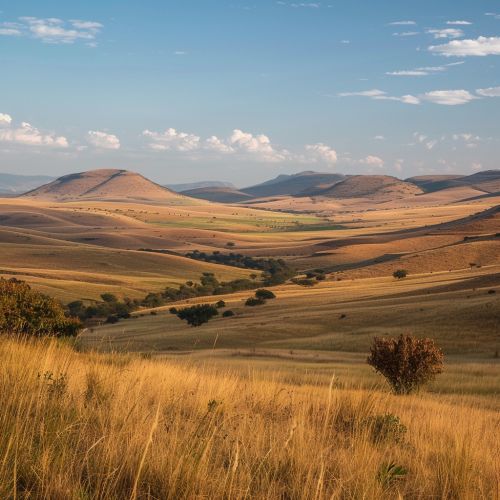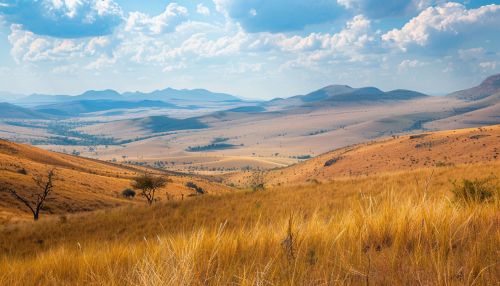Bechuanaland: Difference between revisions
(Created page with "== History of Bechuanaland == Bechuanaland, a historical region in Southern Africa, is now known as Botswana. The term "Bechuanaland" was used during the colonial period to describe the territory inhabited by the Tswana people. The region's history is marked by a series of significant events that shaped its political, social, and economic landscape. === Pre-Colonial Era === Before European colonization, Bechuanaland was home to various Bantu-speaking groups, predomina...") |
No edit summary |
||
| Line 11: | Line 11: | ||
In the late 19th century, the British Empire sought to expand its influence in Southern Africa. The discovery of gold and diamonds in neighboring regions heightened British interest in Bechuanaland. In 1885, the British government declared the area a protectorate, known as the Bechuanaland Protectorate, to prevent German and Boer expansion. The protectorate was divided into two regions: the northern Bechuanaland Protectorate and the southern British Bechuanaland, which was later annexed to the Cape Colony in 1895. | In the late 19th century, the British Empire sought to expand its influence in Southern Africa. The discovery of gold and diamonds in neighboring regions heightened British interest in Bechuanaland. In 1885, the British government declared the area a protectorate, known as the Bechuanaland Protectorate, to prevent German and Boer expansion. The protectorate was divided into two regions: the northern Bechuanaland Protectorate and the southern British Bechuanaland, which was later annexed to the Cape Colony in 1895. | ||
[[Image:Detail-91379.jpg|thumb|center|Scenic landscape of Bechuanaland with rolling hills and savannah.|class=only_on_mobile]] | |||
[[Image:Detail-91380.jpg|thumb|center|Scenic landscape of Bechuanaland with rolling hills and savannah.|class=only_on_desktop]] | |||
=== Administration and Governance === | === Administration and Governance === | ||
Latest revision as of 13:21, 21 June 2024
History of Bechuanaland
Bechuanaland, a historical region in Southern Africa, is now known as Botswana. The term "Bechuanaland" was used during the colonial period to describe the territory inhabited by the Tswana people. The region's history is marked by a series of significant events that shaped its political, social, and economic landscape.
Pre-Colonial Era
Before European colonization, Bechuanaland was home to various Bantu-speaking groups, predominantly the Tswana people. The Tswana established several powerful chiefdoms, including the Bamangwato, Bakgatla, and Bangwaketse. These chiefdoms were organized into a hierarchical system with a paramount chief at the top, followed by sub-chiefs and headmen. The Tswana society was agrarian, with cattle herding and crop farming as the main economic activities.
Colonial Period
In the late 19th century, the British Empire sought to expand its influence in Southern Africa. The discovery of gold and diamonds in neighboring regions heightened British interest in Bechuanaland. In 1885, the British government declared the area a protectorate, known as the Bechuanaland Protectorate, to prevent German and Boer expansion. The protectorate was divided into two regions: the northern Bechuanaland Protectorate and the southern British Bechuanaland, which was later annexed to the Cape Colony in 1895.


Administration and Governance
The British administration in Bechuanaland was characterized by indirect rule, where traditional leaders retained authority over local affairs under the supervision of British officials. The capital of the protectorate was established at Mafeking, located outside the protectorate's borders, to facilitate communication and administration. The British introduced new legal and administrative systems, which often conflicted with traditional Tswana customs.
Economic Development
Economic development in Bechuanaland during the colonial period was limited. The region's arid climate and lack of mineral resources hindered large-scale agricultural and industrial activities. The economy remained predominantly agrarian, with cattle farming as the mainstay. The British administration focused on maintaining stability and preventing conflicts with neighboring territories rather than promoting economic growth.
Path to Independence
The movement towards independence in Bechuanaland gained momentum after World War II. The rise of nationalist movements across Africa inspired the Tswana people to seek self-determination. In 1961, the Bechuanaland People's Party (BPP) was formed, advocating for independence from British rule. However, it was the Botswana Democratic Party (BDP), led by Seretse Khama, that played a crucial role in the independence movement.
In 1965, the British government agreed to grant Bechuanaland self-governance, and elections were held. The BDP won a majority, and Seretse Khama became the first Prime Minister. On September 30, 1966, Bechuanaland gained full independence and was renamed the Republic of Botswana.
Geography and Climate
Bechuanaland, now Botswana, is located in the heart of Southern Africa. It is bordered by Namibia to the west and north, Zimbabwe to the northeast, Zambia to the north, and South Africa to the south and southeast. The region covers an area of approximately 581,730 square kilometers.
Topography
The topography of Bechuanaland is predominantly flat, with vast expanses of savannah and semi-desert landscapes. The Kalahari Desert occupies a significant portion of the region, characterized by sandy soils and sparse vegetation. The eastern part of Bechuanaland features more fertile land, suitable for agriculture and cattle farming.
Climate
Bechuanaland experiences a semi-arid climate, with hot summers and mild winters. The region receives low and erratic rainfall, averaging between 250 to 500 millimeters annually. The rainy season occurs from November to March, while the dry season spans from April to October. The climate poses challenges for agriculture, necessitating the use of drought-resistant crops and efficient water management practices.
Demographics
The population of Bechuanaland, now Botswana, is predominantly composed of the Tswana people, who make up about 80% of the population. Other ethnic groups include the Kalanga, Basarwa (San), and various minority groups. The population is concentrated in the eastern part of the country, where the climate is more favorable for agriculture.
Language
The official language of Bechuanaland was English, which remains the official language of Botswana. However, Setswana, the language of the Tswana people, is widely spoken and serves as the national language. Other languages spoken in the region include Kalanga, Sekgalagadi, and various San languages.
Religion
Traditional African religions were predominant in Bechuanaland before the arrival of European missionaries. The introduction of Christianity in the 19th century led to significant religious changes. Today, the majority of the population in Botswana identifies as Christian, with various denominations present, including Anglican, Methodist, and Roman Catholic. Traditional beliefs and practices continue to coexist with Christianity.
Economy
The economy of Bechuanaland during the colonial period was largely underdeveloped, with limited industrial activities. The primary economic activities were cattle farming and subsistence agriculture. The British administration focused on maintaining order rather than promoting economic growth.
Agriculture
Agriculture in Bechuanaland was primarily based on cattle farming, which played a crucial role in the local economy and social structure. Cattle were considered a symbol of wealth and status among the Tswana people. Crop farming was practiced on a smaller scale, with sorghum, maize, and millet being the main crops cultivated.
Trade
Trade in Bechuanaland was limited due to the region's landlocked position and lack of infrastructure. The Tswana people engaged in barter trade with neighboring communities, exchanging cattle, crops, and handicrafts. The British administration introduced new trade routes and markets, but economic development remained slow.
Modern Economic Development
After gaining independence, Botswana experienced significant economic growth, driven by the discovery of diamond deposits. The government implemented policies to diversify the economy, investing in sectors such as tourism, manufacturing, and services. Today, Botswana is one of the fastest-growing economies in Africa, with a stable political environment and sound economic policies.
Culture
The culture of Bechuanaland is rich and diverse, with a strong emphasis on traditional customs and practices. The Tswana people have a well-defined social structure, with a focus on community and family.
Traditional Practices
Traditional practices in Bechuanaland include various ceremonies and rituals, such as initiation rites, weddings, and funerals. These ceremonies often involve music, dance, and storytelling, which play a crucial role in preserving cultural heritage. The Tswana people are known for their intricate beadwork, pottery, and basket weaving.
Music and Dance
Music and dance are integral parts of Tswana culture. Traditional music is characterized by the use of instruments such as the segaba (a single-stringed violin), drums, and rattles. Dance forms include the borankana, a traditional dance performed during celebrations and ceremonies.
Modern Cultural Influences
The introduction of Western education and Christianity brought significant changes to the cultural landscape of Bechuanaland. Modern influences are evident in various aspects of life, including clothing, music, and art. However, traditional customs and practices continue to play a vital role in the social fabric of Botswana.
Education
Education in Bechuanaland underwent significant changes during the colonial period. The British administration introduced formal education, establishing schools and training institutions.
Early Education
Before the arrival of European missionaries, education in Bechuanaland was informal, with knowledge passed down through oral traditions and practical training. The missionaries established the first formal schools, focusing on religious instruction and basic literacy.
Colonial Education System
The colonial education system in Bechuanaland was limited, with few schools and inadequate resources. The British administration prioritized the education of European settlers and the children of local elites. The majority of the population had limited access to formal education.
Post-Independence Education Reforms
After gaining independence, the government of Botswana prioritized education as a key component of national development. Significant investments were made in building schools, training teachers, and developing curricula. Today, Botswana boasts a high literacy rate and a well-established education system, with primary, secondary, and tertiary institutions.
Political Structure
The political structure of Bechuanaland during the colonial period was characterized by indirect rule, with traditional leaders playing a significant role in local governance.
Traditional Leadership
Traditional leadership in Bechuanaland was based on a hierarchical system, with a paramount chief at the top, followed by sub-chiefs and headmen. The chiefs held significant authority over their communities, overseeing matters such as land allocation, dispute resolution, and social welfare.
British Administration
The British administration in Bechuanaland operated through a system of indirect rule, where traditional leaders retained authority under the supervision of British officials. The Resident Commissioner, based in Mafeking, was the highest-ranking British official in the protectorate. The administration focused on maintaining stability and preventing conflicts with neighboring territories.
Independence and Modern Governance
The transition to independence brought significant changes to the political structure of Bechuanaland. The new Republic of Botswana adopted a democratic system of governance, with a President as the head of state and a multi-party parliamentary system. The traditional leaders continue to play a role in local governance through the House of Chiefs, an advisory body to the government.
